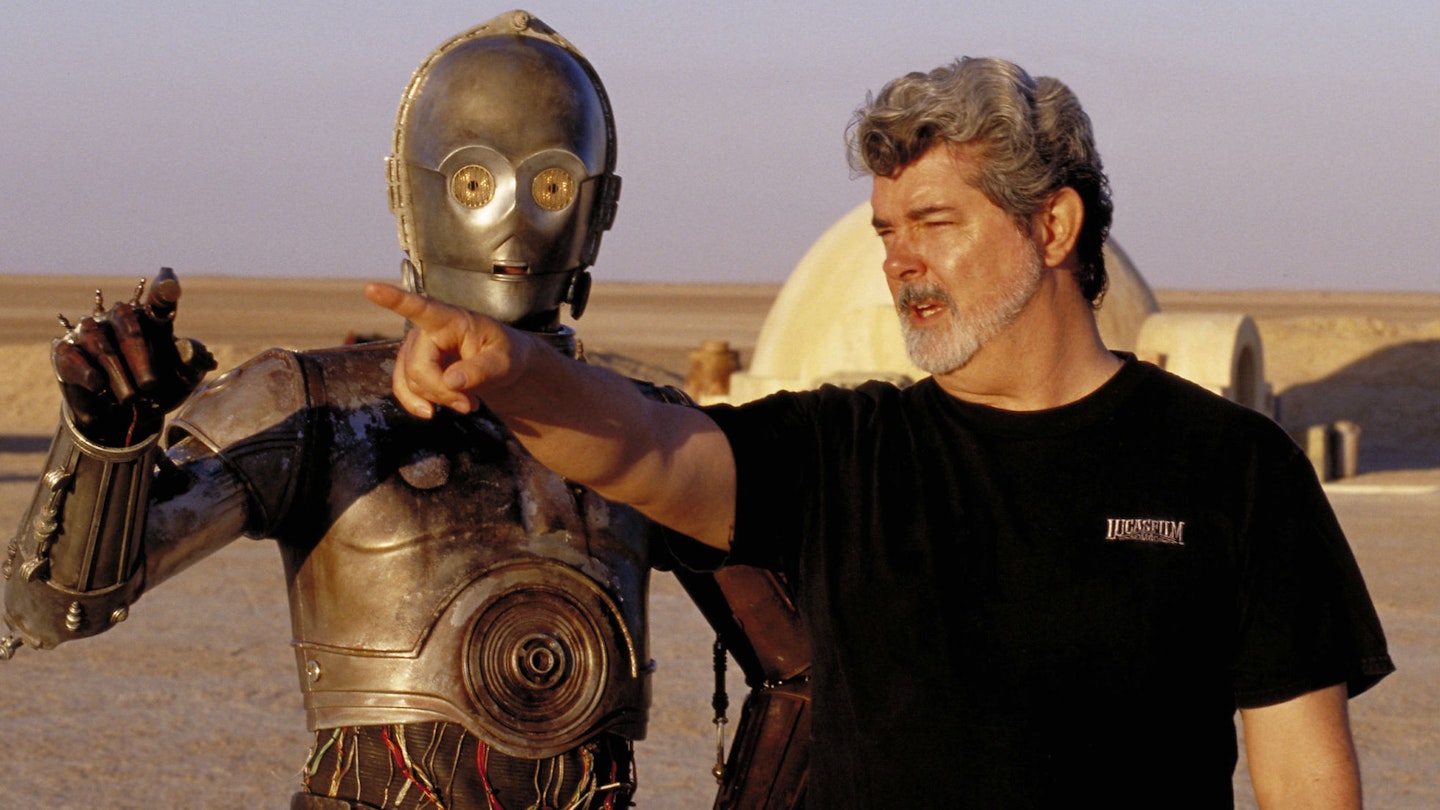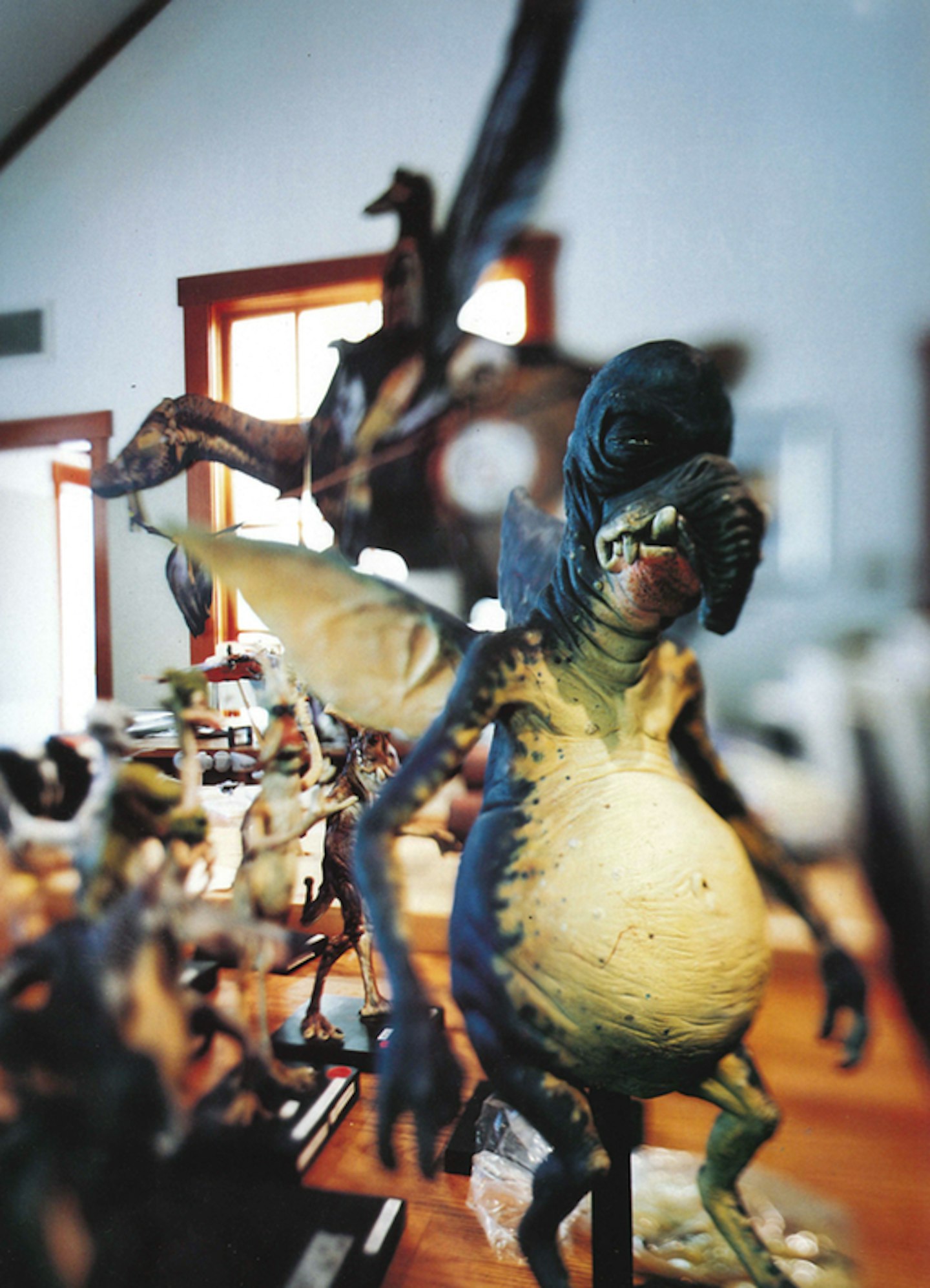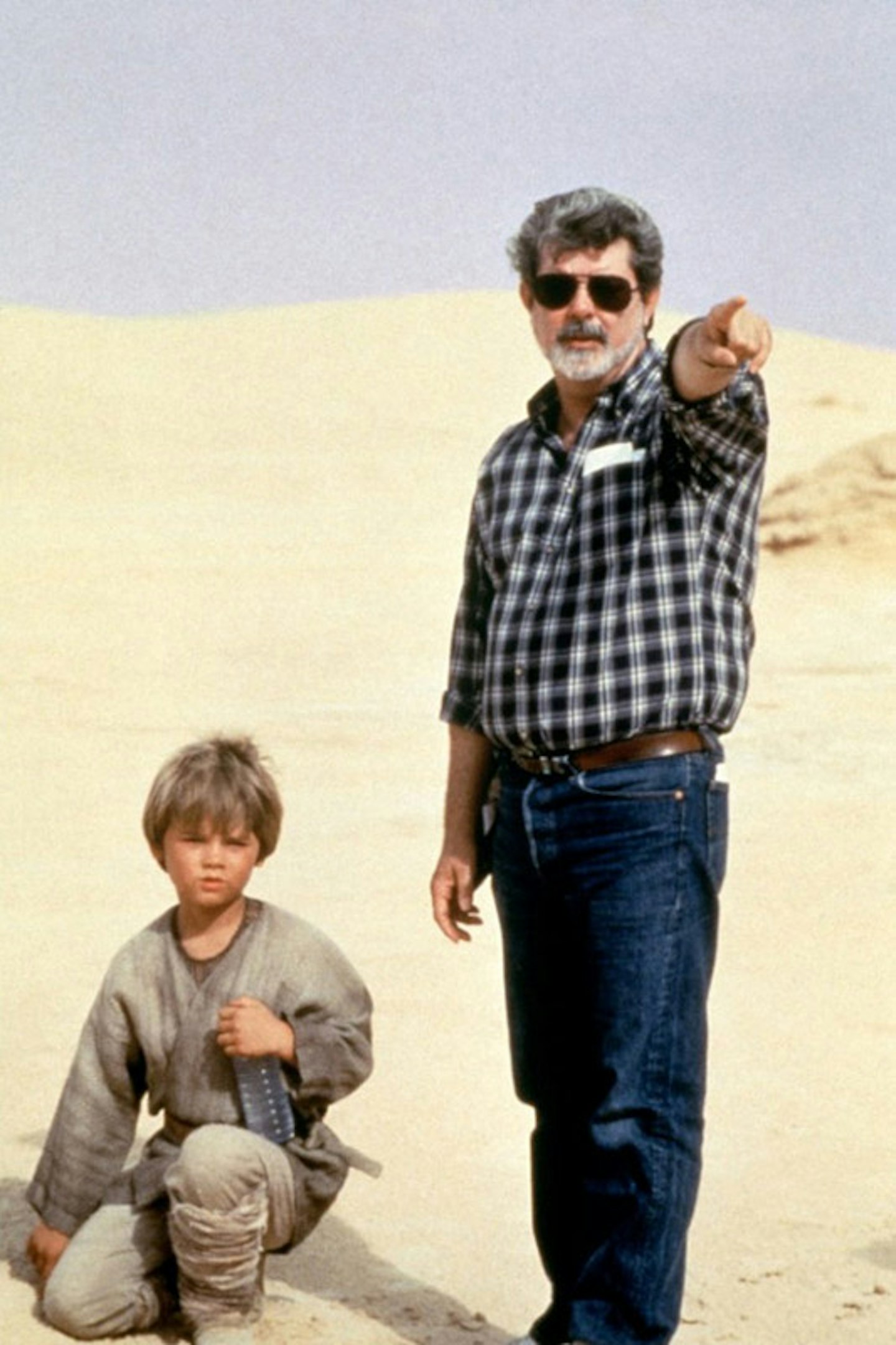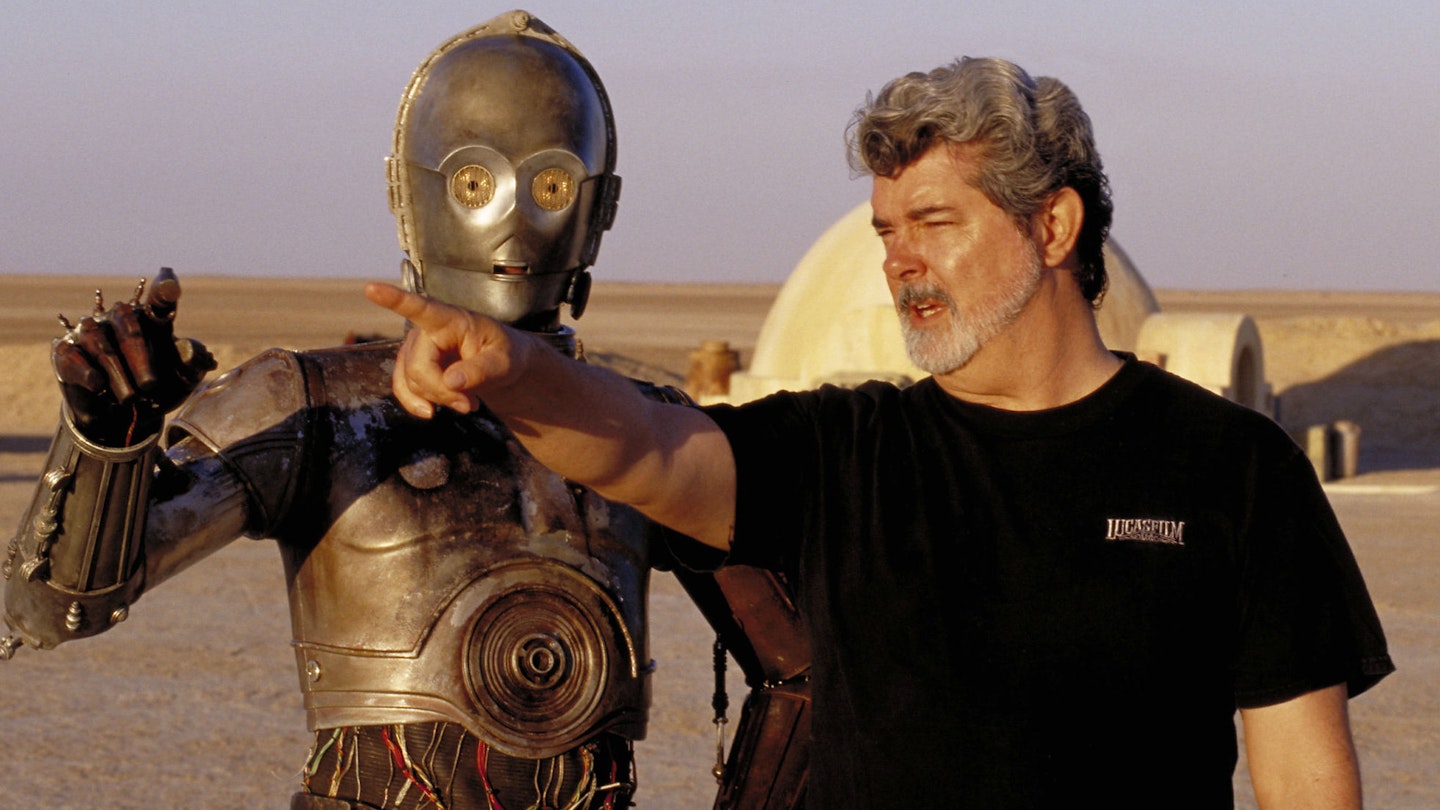This article first appeared in Empire Magazine Issue #123 (September 1999).
“Oooh, it’s cold in here," begins George Lucas, reassuringly decked out in trademark jeans and check shirt – today it's the blue and white one – ambling into a swish Loridon hotel suite where the air conditioning is blowing icy blasts.
It is the morning after The Phantom Menace premiere and party, yet a healthily visaged Lucas looks in little need of Alka Seltzer and a full English brekkie. Besides, there are more pressing matters at hand. With Episode 1's worldwide roll-out escalating, the latest instalment of his 22-year-old saga is slowly slipping out of Lucas' charge and into the public domain. As the film raises spirits, hackles and questions in multiplexes around the country, there couldn't be a more pertinent time to be meeting George Lucas: until now the 55-year-old filmmaker could talk in vagaries, confident no one had seen his handiwork; now the cat is out the bag and music must be faced.
I'm sorry if they don't like it. They should go back and see The Matrix or something.
Lucas' journey to his pre-eminent status is so well documented that it needs only the briefest of summaries. Teen rebel. Life-changing car accident. University Of Southern California Cinema School hotshot. Coppola protege. Alienated audiences with THX 1138. Hit paydirt with American Graffiti. Went stellar with Star Wars. Cue two sequels, Indiana Jones, groundbreaking initials (ILM, THX) and a ranch-cum-filmmaking think-tank. Yet, behind the thumbnail biog are some fascinating anomalies; the experimental film student who became the most commercially successful director in the world, the intellectual who churns out kiddie pics, a filmmaker who fought hard for creative autonomy, yet resisted feature length directing for some 20 years. While Episode I will form the bulk of Empire's grilling, there is obviously much more than pods, Palpatine and pit droids to be covered here.
Contrary to his media shy/interview despising reputation, over the ensuing 45 minutes, Lucas emerges as a gracious, communicative, frequently frank host, lacing his speech with nervous laughter, waving his hands to punctuate points and maintaining frequent eye contact through his brown, thin-rimmed specs (and he gives good handshake).
Without a swarm of clipboarded headsetted PR lackeys tending his whims, he is keen to talk about your work - "Yours is a movie magazine that actually likes movies. So few of them do"- while happily chewing the fat about his own. Once this press push is over, he is returning to San Francisco to start penning Episode II - a task he broaches with somewhat surprising reluctance ("I'm like, 'Well, I can start it after the weekend'").
It's been eight weeks since The Phantom Menace bowed stateside and the entire planet has had its say. As he settles into a comfy looking sofa - a squirrel patterned cushion incongruously to his left, a bunny patterned cushion incongruously to his right - now, for the first time at any length, Lucas gets to have his say too.

Is it true that you had a wager with Steven Spielberg about The Phantom Menace's opening weekend gross?
Ah... yes.
Who won?
He won. Mine was way too low.
You've often said that Star Wars movies are primarily meant for children, but The Phantom Menace was always going to be a film that was going to be significant for twenty/thirtysomethings. How did you address this problem?
Basically I didn't. I kept it as it was originally intended. You can't play too much to the marketplace. It's the same thing with the fans. The fans' expectations had gotten way high and they wanted a film that was going to change their lives and be the Second Coming. You know, I can't do that, it's just a movie. And I can't say, now I gotta market it to a whole different audience. I tell the story. I knew if I'd made Anakin 15 instead of nine, then it would have been more marketable. If I'd made the Queen 18 instead of 14, then it would have been more marketable. But that isn't the story. It is important that he be young, that he be at an age where leaving his mother is more of a drama than it would have been at 15. So you just have to do what's right for the movie, not what's right for the market.
The next film is a love story and I don't know how that is going to be taken by the fans. They think of Star Wars as one kind of movie. And it's drifting a little more - by the nature of it being a love story, it's less of a kids' movie because they don't like to sit through all that yucky stuff. But it's still aimed at the same age level, so it's going to be a real challenge for me to get through that part. And then the third film is very, very, very dark. It's not a happy movie by any stretch of the imagination. It's a tragedy. People think of the Star Wars movies as happy movies. What they're going to do about a tragedy, I don't know. It will probably be the least successful of all the Star Wars movies - but I know that.

How does the process for writing Episodes II and III work?
It's mostly storylines, they've not got that much detail in them. I know the characters, where they go and what they do, but the details - who the characters interact with, the plot devices and the dialogue - are not set yet. It shaves down, as time goes on, things are eliminated. Ultimately the final story is between Yoda, Obi-Wan, Anakin and the Queen. It's really their story. Those four characters.
Did the stinging American reviews hurt?
The critics pretty much hated the first three movies; they said the dialogue is bad, the acting's wooden, no story, too many special effects, it's a children's film. That same review got moved to Empire Strikes Back, that same review got moved to Return Of The Jedi and that is the review that is getting reprinted now. You'd think that after a while, they'd figure out that's what these things are. It's always gonna be like that because I see it as one movie, not six. The irony was that it was written about Star Wars that in C3PO I had created the most irritating character ever created on film. Now one of the reviews for The Phantom Menace says in Jar Jar I have created the most irritating character ever created on film. It's exactly the same sentence. It was like, "Hey, haven't I been here? I already did that once."
Speaking of Jar Jar Binks, certain sections of the fanbase and audience have violently taken against him. Can you see where they are coming from?
Yeah. It's always been there. There's a group of fans who don't like comic sidekicks. They wanna see The Terminator, they wanna see a different kind of movie. But this isn't that movie. That same group of fans absolutely hated R2 and C3PO in the first film; in the second film they hated Yoda, he was not a well-liked character – "we can't understand what he's talking about, he's green, he's a muppet." In the third film, they hated the Ewoks, couldn't stand the cute little sidekick characters – "we don't like it. It makes it beyond a children's film." They can't stand it that there is this aspect to these movies, but comic sidekick characters have been in every single movie.
And will they continue to be?
And they will continue. I'm sorry if they don't like it. They should go back and see The Matrix or something. These are PG movies. I'm not gonna take those kinds of characters out. Obviously when you get a small group of fans who hate something, it becomes compounded by the internet. The press picks up the internet like it's a source. They don't realise it is just one person typing out their opinion. It's been my experience, and the experience of 20th Century Fox, that most of the people who go to the movie, at least 95 per cent, love Jar Jar. He's extremely popular with kids. He's popular with women. It's funny that the five per cent of the audience - even less probably - who don't like Jar Jar are the ones that get written about. In the toy world, Darth Maul is the biggest seller, but Jar Jar is up there. Part of it is an ageism thing. "I'm cool, I'm hip, I'm embarrassed I'm liking a movie that appeals to young kids." You have to get over the fear of being declared unhip or not tough.
I'd be the first person to say I can't write dialogue.
You mentioned Darth Maul. A common reaction of audiences is "Maul is so cool". So why isn't he in it more?
(Resignedly) It's not about him... ha, ha, ha. Obviously everyone likes the villain better than they like the heroes, that's sort of a tradition. And obviously I was trying to make a villain who
was sufficient to replace Darth Vader, because Vader was such a great villain, I needed something to stop people saying, "ah, what a wimpy villain next to Darth Vader." I wanted something that revealed a little more understanding of what an apprentice is, because this is obviously where this is all going. At one point, when Obi-Wan kills Darth Maul, he just fell in the pit. I looked at it and thought this isn't going to work because, if people like him enough, they're going to want him to come back and they're going to assume somehow he gets out of it. So I had to cut him in half to say that this guy's gone, he's history, he ain't coming back. I'll come up with another apprentice. The whole issue of having apprentices, poor Darth Sidious trying to replenish his apprentice supply, is one of the main plot points.
Does the Podrace stem from your days as a boy racer?
I like racing. I love the speed and I'm a very kinetic person in terms of filmmaking. I love the movement of film more than anything else. The cinematic quality of it attracts me. I like visual imagery, but I started out in pure film which is really a kinetic experience. So that's where my focus is. That's why I intend more of a kinship with silent films than more modern film. I like the old cinema. My films are more of a hybrid – a different style of filmmaking to what I call talking head movies. Some people don't get it. Especially the more academic types. They're used to a particular kind of movie and if you bring them something else, they don't understand it.
How do you react to criticisms that the performances in The Phantom Menace are poor?
The acting in Star Wars movies is a throwback to an earlier time – the 30s and 40s and more theatrical acting than method and realism. When you get away from that convention, a lot of people don't understand it any more. They're used to a more affected kind of style. People who aren't academically-oriented, like kids, they don't know any of that and just take it for what it is and think it's great.
The other stick everyone likes to beat you with is that you can't write dialogue...
I'd be the first person to say I can't write dialogue. My dialogue is very utilitarian and is designed to move things forward. I'm not Shakespeare. It's not designed to be poetic. It's not designed to have a clever turn of phrase. On the very first film, I had Bill and Gloria Hyuck (American Graffiti screenwriters) go through and do a dialogue polish on it. And that ultimately came down to maybe a dozen lines, where they added a snappy retort. After a while of working in the medium, I decided that wasn't ultimately essential to making the movies. So in the last few movies we did not try and be clever with the dialogue. I just wanted to get from point A to point B. This film doesn't lend itself to that sort of thing because it's not about snappy one-liners.

I think that Lethal Weapon-style dialogue is overused, it's a necessary aspect of high action films where you have to have the smart retort. You have to say "I'll be back baby" and stuff. It's not my style. It takes away from the integrity of the movie. In the first film, the characters were of that nature, especially Han Solo. I have to tell you when Anakin gets older, he's more in that mode and there will be a lot more of that thing going on. In this one, there's not. It's not a formula. There was no place for that kind of thing in this particular movie. I'm aware that dialogue isn't my strength. I use it as a device. I don't particularly like dialogue which is part of the problem.
I'm not that passionate about this story. I like it, it's fun and I enjoy doing it. But it's definitely not my life.
In A New Hope, R2-D2 and C-3PO land on Tatooine and haven't got a clue where they are. Yet in The Phantom Menace, R2 travels to Tatooine and C-3PO was built there. How so?
How so? That will all be coming up. (laughs) There's a lot of little things that'll be cleared up. The other one that gets asked a lot is why doesn't Qui-Gon disappear like everybody else. That's a plot point that centres around Obi-Wan saying to Vader/Anakin in the first
one, "If you strike me down, I will become more powerful than you can possibly imagine." There is an issue about The Force and that will be revealed.
Does this sort of retro reading get on your nerves?
A lot of it is just nitpicky. Most people don't care about that stuff. There's a lot of things that will be explained more. Some of it is important plot stuff – the Qui-Gon one is, 3PO isn't.
You've often said that The Phantom Menace took 16 years because you were waiting for the technology to catch up. Surely, if you were really passionate about this story, you would have made it by hook or by crook?
Yeah; but I'm not that passionate about this story. I like it, it's fun and I enjoy doing it. But it's definitely not my life. I'm a bigger movie fan than I am Star Wars fan. I like making movies. At the end of nine years of making Star Wars, I was not ready to continue it. I was completely burned out on it. I was more passionate about raising my kids than making movies and especially making Star Wars. So I made other kinds of movies and TV shows and advanced the technology I needed.
It's not a matter of passion. My passion is for filmmaking. I'll go and do filmmaking that is easier to do, where you can realise your ideas better. And nine years is a big part of your life, and to commit to another nine years, I didn't wanna do that right away.

Do you think Empire and Jedi would have been a lot different if you had directed them yourself?
To be very honest with you, no I don't. I was very close on those movies. If anything, Irvin Kershner (director, Empire Strikes Back) gave it a different patina that I wouldn't have done. I don't think you would have noticed it if you compared the two. His personality is there in a way that, to me, makes it a nicer movie. The movie itself is in essence the same thing. It's a hard thing to describe: it's like seeing a rough cut of the movie and seeing a fine cut of a movie - they're sort of the same movie, but just that little bit different. I don't think ,there would have been major shifts.
Is it frustrating that there are parts of your personality that you can't express within Star Wars movies?
I have lots of movies I wanna make that I'm more interested in than Star Wars, that I have had to push aside in order to do Star Wars. There's always this conflict of what am I gonna do next.
Are the films you want to make outside Star Wars, the small scale esoteric movies that you've always promised to make?
Yeah, those kinds of movies. There's a lot of historical pieces I'm interested in. Lots of things that will probably not be that popular, but I'll enjoy making.
Francis Ford Coppola often says about you that the day Star Wars became successful, America was deprived of one of its most challenging filmmakers. Fair comment?
Well... I ended up going off in a different direction. Life sends you down funny paths. And you get many opportunities to keep your eyes open. In that group, I was the most far out and I ended up making children's films. (Laughs) How do you figure that? I was more of a cinéma vérité documentary San Francisco underground filmmaker. I had no interest in doing theatrical films at all. It's really Francis' influence that sent me into theatrical films, that taught me working with actors, writing screenplays and doing all that stuff. And I spent a lot of my time writing screenplays, which was the thing I hated the most. I just hated my writing Classes because I didn't believe that's what cinema was. And I went off in this other direction. Well who knows? Because Star Wars was successful, it was easier for me to survive. I can actually build a survival unit – build up ILM, build up Skywalker sound – and create an organisation to make the kind of movies I wanted to make.
Finally, if you were to pick one image from your movies to stand for your body of work, which would you pick?
Oh God ... Um, maybe the last shot in THX 1138 when the guy is standing against the sinking sun. I don't know why.
Visit Empire's celebration of the Skywalker Saga for even more Star Wars content.
